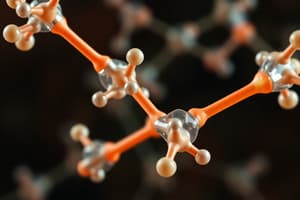Podcast
Questions and Answers
Which statement accurately characterizes inorganic molecules?
Which statement accurately characterizes inorganic molecules?
- They include compounds created through biological processes.
- They can only exist in gaseous states.
- They do not contain both carbon and hydrogen. (correct)
- They must contain both carbon and hydrogen.
What is the significance of water's polar nature?
What is the significance of water's polar nature?
- It prevents the formation of hydrogen bonds.
- It enables water to conduct electricity.
- It allows water to act as a solvent. (correct)
- It makes water less dense at solid state.
How does the composition of a water molecule contribute to its properties?
How does the composition of a water molecule contribute to its properties?
- Unequal sharing of electrons creates partial charges. (correct)
- The presence of hydrogen atoms makes water non-polar.
- Water has a linear structure that increases its density.
- Water is purely composed of hydrogen which determines its properties.
What role do covalent bonds play in organic molecular formation?
What role do covalent bonds play in organic molecular formation?
Which of the following statements about the abundance of elements in the human body is true?
Which of the following statements about the abundance of elements in the human body is true?
What accounts for the partially positive charge of hydrogen atoms in a water molecule?
What accounts for the partially positive charge of hydrogen atoms in a water molecule?
How does water effectively dissolve ions and polar molecules?
How does water effectively dissolve ions and polar molecules?
What is the significance of water's high specific heat capacity?
What is the significance of water's high specific heat capacity?
What role do hydrogen bonds play in water's properties?
What role do hydrogen bonds play in water's properties?
Why are non-polar molecules generally insoluble in water?
Why are non-polar molecules generally insoluble in water?
Flashcards are hidden until you start studying
Study Notes
Biochemical Molecules
- The body consists of two types of biochemical molecules: organic and inorganic.
- Inorganic Molecules: Do not contain both carbon and hydrogen; examples include water (H₂O) and hydrochloric acid (HCl).
- Some inorganic compounds, like carbon dioxide (CO₂), can contain carbon.
Properties of Water
- Composed of hydrogen and oxygen with the formula H₂O.
- Each molecule consists of two hydrogen atoms covalently bonded to one oxygen atom.
- Vital for cellular structure, comprising 70 to 95 percent of cell mass.
- Water is a polar molecule due to unequal sharing of electrons, creating partial charges.
- Water molecules attract each other due to their polarity.
Water as a Solvent
- Water effectively dissolves ions and polar molecules due to attraction between water and solutes.
- Positive ends of water surround negative ions and vice versa to facilitate dissolution.
High Specific Heat Capacity
- High specific heat capacity indicates the energy needed to change water's temperature is significant.
- Hydrogen bonds keep water molecules linked, requiring energy to break these bonds.
- This property helps stabilize temperatures, crucial for biological processes.
High Latent Heat of Vaporization
- Water's latent heat of vaporization is high due to the need to break hydrogen bonds for vaporization.
- Significant energy is necessary for water to transition from liquid to vapor.
Density and Freezing Properties
- Unique property: ice is less dense than liquid water, allowing it to float and insulate water below.
- Water density decreases below 4°C, helping support life in cold temperatures.
Cohesion and Surface Tension
- Water's high cohesion creates strong intermolecular forces, leading to high surface tension.
- This allows small organisms to walk on water and facilitates capillary action.
Boiling and Freezing Points
- Water boils at 100°C and freezes at 0°C due to extensive hydrogen bonding.
- These high boiling and freezing points are critical for maintaining aquatic ecosystems.
Inorganic Ions
- Inorganic ions, or minerals, are charged entities often required for biological functions.
- They can be classified into macro-nutrients (needed in larger amounts) and micro-nutrients (trace elements).
Important Inorganic Ions
- Hydrogen Ions: Essential for pH balance; concentration affects metabolic processes.
- Sodium Ions: Key for nerve function and fluid balance, found in common salt; daily need is 3-6 grams.
- Potassium Ions: Major intracellular cation; crucial for cell function, found in fruits and vegetables; daily requirement is 3-4 grams.
- Calcium Ions: Most abundant inorganic ion; vital for bones, muscle function, and signaling; daily intake should be around 800 mg.
- Phosphate Ions: Negatively charged ions important for energy transfer and bone health.
- Copper Ions: Important for enzyme function and nervous system development; sourced from shellfish, nuts, and grains.
- Iodine Ions: Necessary for thyroid hormone production; found in iodized salt and seafood; daily requirement is 150 µg.
Clinical Conditions Related to Ion Imbalance
- Iron-deficiency Anemia: Low iron levels lead to fatigue and weakness.
- Hemosiderosis: Excess iron accumulation can damage organs.
- Wilson's Disease: Abnormal copper metabolism causing organ damage.
- Goiter: Enlarged thyroid from iodine deficiency or excess.
Studying That Suits You
Use AI to generate personalized quizzes and flashcards to suit your learning preferences.




